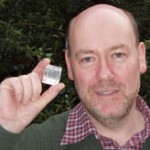
Steve Haswell, University of Hull
A hand-held DNA testing device developed by UK scientists is set to change the way forensic analysis of DNA is conducted.
Normally, DNA samples have to be transported back to the lab and need trained people using expensive instruments to conduct the analysis. Steve Haswell and his team at the University of Hull have developed the lab-on-a-chip technology that will reduce the time it takes to produce results from days to hours.
DNA profiling involves extraction of DNA from a sample obtained at a crime scene, amplification and separation of the DNA strands, and detection of a strand’s unique ‘signal’. Haswell’s device is about the size of a microwave oven and he hopes to start field trials with the UK police soon.
Abstract
Whilst much of the cell based research carried out to date has focused primarily on cell processes, in reality cells in general do not exist in isolation but form complex networks or tissues in which the communication between cells is often as important as the individual cell function.
Here we propose developing analytical tools that will enable the study of cellular interactions in tissues. Such methodology will be instrumental, for example, in identifying how drug delivery strategies (i.e. getting active agents to the right place) and disease states associated with tissue degradation (muscle wastage and dementia) will be treated in the future.
The proposed methodology will be based on micro fluidic or capillary networks which can be used to control the temporal and spatial manipulation of cells and reagents. Such systems, which mimic to a great extent the natural supporting tissue infrastructure such as blood capillary and lymphatic systems, can be integrated with analytical and detection techniques to offer a unique environment in which to study tissue and cell processes.
The applicants have already secured a number of grants in the research area including GBP 721k recently awarded from EPSRC to develop a portable integrated DNA analyser. One of the exciting aspects of this current proposal is the opportunity to link it closely with the forensic project and develop in parallel a micro fluidic system that will allow the introduction and manipulation of tissue samples to be carried out in combination with DNA analysis.
In addition the two analytical modules (mass spectrometry and FACS) that will be developed in this project, will create with the PCR work a truly unique and flexible research platform on which to develop personalised medical methodology.

